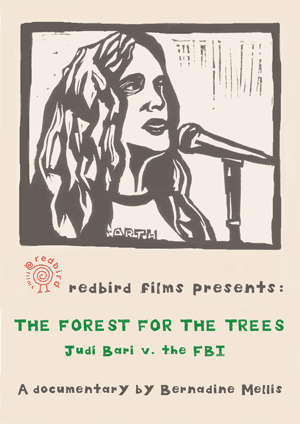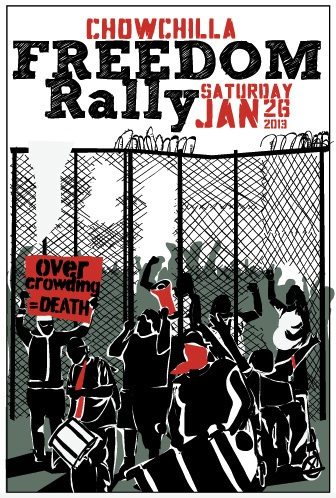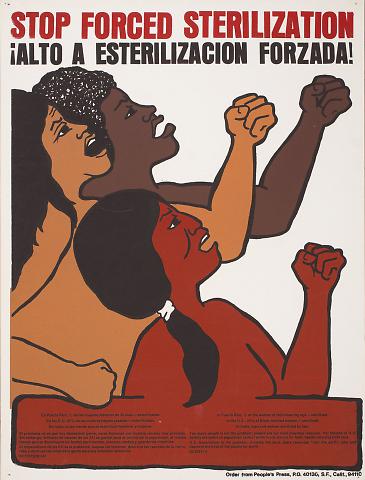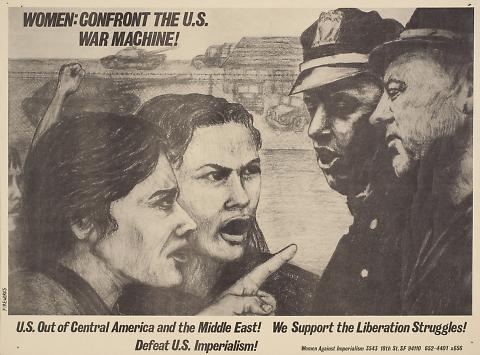Gender and Sexuality
This collection features materials from a number of sources focusing on struggles revolving around gender and sexuality. These struggles are not separate from larger struggles for liberation but specifically incorporate unique voices and perspectives.
Subcollections
-
Connexions
Connexions is the collective product of feminists of diverse nationalities and political perspectives committed to contributing to an international women\'s movement. -
Feminist and Lesbian Politics: Monographs-Periodicals-Articles
This collection contains materials focusing on radical feminist and lesbian politics. While diverse in medium and subject matter, this collection contextualizes women’s liberation highlighting issues of class, race, sexuality and imperialism. -
Materials shot and collected in the making of The Forest for the Trees
Raw materials from the documentary "The Forest for the Trees" which details the amazing story of the fight to clear Earth First! activist Judi Bari's name after her car was bombed and she was arrested as a terrorist. -
Out of Control: Lesbian Committee to Support Women Prisoners
Out of Control (OOC) was a self-supporting committee formed in 1987 to organize resistance to the Lexington Control Unit for women. -
Prisons - Women
This collection contains materials relating to the specific conditions, challenges and struggles facing women in prison. Topics are varied but materials include conference papers, informational materials, legal perspectives and audio recordings. -
Programs produced by Judy Gerber and Laurie Simms
This collection contains grassroots radio programming produced by Judy Gerber and Laurie Simms. This programming primarily occurred during the 1980s and 1990s. -
Sterilization
This collection contains materials focusing on the sterilization of women and efforts to resist this practice. -
Violence Against Women
This collection contains materials focusing on violence against women. Specific topics covered include women who fight back against their abusers, rape, pornography, sexism and self-defense. -
Women Against Imperialism
Women Against Imperialism was a grassroots, feminist, anti-imperialist solidarity organization formed in San Francisco in 1981. Women Against Imperialism’s work primarily consisted of direct action organizing and political education activities.
Documents
Date: 10/21/1994Call Number: JG/ 089AFormat: Cass AProducers: Judy GerberProgram: A Defiant HeartCollection: Programs produced by Judy Gerber and Laurie Simms
Jose Ponce, 1st Secretary of the Cuban Interest Section in the U.S. (the only formal forum of Cuba/U.S. diplomatic contact) speaks at Emory University, GA, October 5, 1994. Ponce summarizes the history of Cuba following the Spanish-American War. He glorifies the achievements of the Cuban communist system: full literacy, power, free education, universal healthcare, antiracism efforts, advances for women, Cuban aide to needy foreign countries. He decries U.S. attempts to sabotage Cuba, specifically the trade embargo which has cost $40 billion dollars, restrictions on remittances, travel bans, and assassination attempts. He argues that the embargo and subsequent loss of infrastructure gave Cuba with no other choice but to ally itself with COMECON and copy the Soviet model. He explains how the 1989 USSR collapse and subsequent loss of 85% of its national trade greatly diminished the Cuban standard of living. He discounts the Cuban pro-democracy protests because he argues Cuba is already a democracy with a rich grassroots political life and elected parliament, just not a multiparty system. He discusses how Cuba is currently debating the first tax in its post-revolutionary history to help revive the declining economic infrastructure.
Date: 9/1/1995Call Number: JG/ 095Format: CassetteProducers: Judy GerberProgram: A Defiant HeartCollection: Programs produced by Judy Gerber and Laurie Simms
Excerpt of a talk by Andres Gomez, National Coordinator of the Antonio Maseo Brigade, a group of Cuban Americans in support of Cuba and opposed to the U.S. embargo. Gomez begins his talk by optimistically noting recent efforts at Caribbean regional cooperation. He then discuses the long course of U.S.- Cuba relations. He decries how some 35,000 Cubans have been held over the past year
at Guantanamo Bay for desiring to immigrate to the U.S. whereas the U.S. had actively encouraged Cuban immigration for the past 35 years. Gomez believes that the Cuban Revolution embodies Cuba at heart and that U.S. imperial efforts to destroy the Revolution have hurt the Cuban people. He notes social
gains in Cuba over the past 32 years compared to the U.S. but notes that the poor economic situation in '92 and '92 with the demise of the U.S.S.R. have been very trying for the Revolution. He believes that Cubans must now build socialism under different terms with the new national and international circumstances. He sees a need for a freer, more participatory Cuban society, but insists that the U.S. likewise faces many problems of its own.
Date: 10/25/1992Call Number: JG/ 102Format: CassetteCollection: Programs produced by Judy Gerber and Laurie Simms
In Part 1 of this moderated discussion recorded in 1992, Sonja De Vries and Jorge Cortinas talk about their experiences in Cuba and their observations on how HIV/AIDS and other LGBT issues are addressed in the country. De Vries spent six months in Cuba interviewing gay men and women. Cortinas spent a year in Havana, working for the National Center for Health Education. Several key topics raised during the discussion include: how the Communist party in Cuba is dealing with HIV/AIDS and LGBT issues, the impact of U.S. foreign policy, the effectiveness of sanatoriums, and different methods of safe sex education. In addition to this, both De Vries and Cortinas talk about daily aspects of queer life in Cuba, like the visibility of the LGBT community and the influence of machismo.
Date: 10/25/1985Call Number: JG/ 103Format: CassetteCollection: Programs produced by Judy Gerber and Laurie Simms
In Part 2, the question and answer portion of a moderated discussion continues. Members of the audience asked the speakers, Sonja De Vries and Jorge Cortinas, questions that called for a further exploration of the impact of race, class and colonialism on Cuba. De Vries and Cortinas talk about their experiences in Cuba and their observations on how HIV/AIDS and other LGBT issues are addressed in the country. De Vries spent six months in Cuba interviewing gay men and women. Cortinas spent a year in Havana, working for the National Center for Health Education. Several key topics continued from Part 1 include: how the Communist party in Cuba is dealing with HIV/AIDS and LGBT issues, the impact of U.S. foreign policy, and the effectiveness of sanatoriums.
Call Number: JG/ 029Format: CassetteProducers: Judy GerberCollection: Programs produced by Judy Gerber and Laurie Simms
Various voices on HIV/AIDS policies in Cuba and its past and present polices on gays and lesbians. Journalist Karen Wald discuss Venceremos' old policy of not allowing gays and lesbians to join the brigade. NOTE: This tape seems to be Part 3 continuing from JG 102 and JG 103.
Date: 1/1/1982Call Number: Vin 002Format: VinylProducers: Paredon Records, Silvio RodriguezCollection: Programs produced by Judy Gerber and Laurie Simms
Songs that celebrate the twentieth anniversary of the Cuban Revolution. Silvio Rodriguez was part of music movement called Nueva Trova Cubana, or New Cuban Song, that revolutionized Cuban music. Songs reflect the political and social culture of post-revolution Cuba. Includes liner notes with translations and contextual information.
Date: 1/1/1971Call Number: Vin 007Format: VinylProducers: Paredon Records, the Experimental Sound Collective of the Institute of Cinematographic Arts, Industries.Collection: Programs produced by Judy Gerber and Laurie Simms
Songs in celebration of the new cultural identity of Revolutionary Cuba. Spanish songs written by Silvio Rodriguez, Noel Nicola, and Pablo Milanes. Includes Paredon Records catalogue from 1971.
Date: 1/1/1982Call Number: Vin 021Format: VinylProducers: Paredon Records, Silvio RodriguezCollection: Programs produced by Judy Gerber and Laurie Simms
Songs that celebrate the twentieth anniversary of the Cuban Revolution. Silvio Rodriguez was part of music movement called Nueva Trova Cubana, or New Cuban Song, that revolutionized Cuban music. Songs reflect the political and social culture of post-revolution Cuba. Includes liner notes with translations and contextual information.
Date: 9/4/1989Call Number: JG/ 155Format: CassetteProgram: Just PeaceCollection: Programs produced by Judy Gerber and Laurie Simms
This recording features the testimony of ex-CIA agents who had become disillusioned with various CIA actions around the world including the liaison operations, subsidiary intelligence services, manipulation of foreign governments and attempts to subvert democracy in other countries. Specific examples include CIA involvement in El Salvador, Nicaragua, Cuba and Angola.
Date: 10/5/1994Call Number: JG/ 158AFormat: Cass AProducers: Judy GerberProgram: A Defiant HeartCollection: Programs produced by Judy Gerber and Laurie Simms
Joe Ponce speaks on the United States’ embargo on Cuba and the conditions of Cubans on the island. Ponce criticizes the US embargo on Cuba especially the fact that the US has negatively impacted Cuba’s trading relationships with other countries. For example, Ponce describes how Cubans living in the U.S. can’t even send remittances to their families in Cuba. Mr. Ponce calls for support from the audience to end the U.S. embargo on Cuba.









